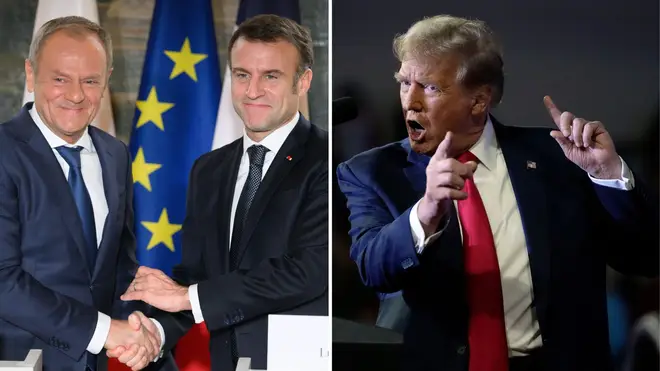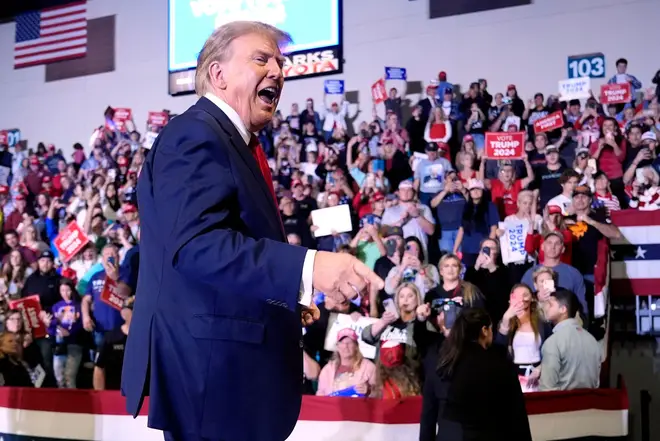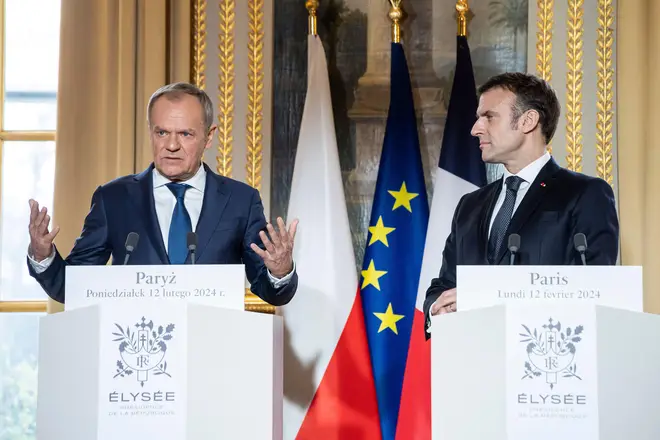
Nick Ferrari 7am - 10am
13 February 2024, 00:47

European leaders have vowed to create a defence power with a greater ability to back Ukraine ahead of a possible return to the White House for Republican frontrunner Donald Trump.
Representatives from the governments of Poland, France and Germany met in the Paris suburb of La Celle-Saint-Cloud on Monday to hold talks about Ukraine, amid other issues.
The ministers discussed reviving the so-called Weimar Triangle, a long dormant regional grouping that was designed to promote cooperation between France, Germany and Poland after the latter emerged from decades of communism in 1991.
It comes as fears grow among European governments that former US President Donald Trump might return to the White House and allow Russia to expand its aggression on the continent.
Polish Prime Minister Donald Tusk, who met with French President Emmanuel Macron in Paris and German chancellor Olaf Scholz in Berlin on Monday, said he wanted to "revitalise" his nation's relations with its key European partners.

Read More: Trump asks Supreme Court to extend delay in election interference trial
Read More: Trump attends federal court for closed hearing in classified documents case
"There is no reason why we should be so clearly militarily weaker than Russia, and therefore increasing production and intensifying our cooperation are absolutely indisputable priorities," Tusk said in arguing for the European Union to become "a military power" in its own right.
Trump shocked European leaders over the weekend by his comments at a rally, claiming he "would not protect" any Nato country that did not meet its military spending commitment of 2 per cent of its GDP if he is reelected.
Trump said he would instead "encourage them (Russia) to do whatever they want."
"'You didn't pay? You're delinquent?'" Trump recounted telling an unidentified Nato member during his presidency. "'No, I would not protect you. In fact, I would encourage them to do whatever the hell they want. You gotta pay. You gotta pay your bills.'"
The Republican front-runner's words at a campaign rally were particularly shocking for front-line Nato countries like Poland, which experienced both German and Soviet occupation during the Second World War and later spent decades under Soviet control.

Speaking alongside Tusk in Berlin, Scholz blasted Trump's comments.
"Nato's promise of protection is unrestricted - 'all for one and one for all,'" Scholz said without mentioning the former president by name.
"And let me say clearly for current reasons, any relativisation of Nato's support guarantee is irresponsible and dangerous, and is in the interest of Russia alone," the chancellor added.
"No one can play, or 'deal,' with Europe's security."
Trump's remarks raised concerns that if re-elected, he could embolden Russia to attack other countries besides Ukraine.
Nato secretary-general Jens Stoltenberg issued a statement on Sunday saying that Trump's remarks put American troops and their allies at greater risk.
Nato does not require its 31 members to pay bills, but they are expected to invest a certain percentage of their own budgets - ideally, 2% of their gross domestic product - on defence.
Some countries, like Poland, have long met the target. Other European nations like Germany ramped up their military spending after Russia invaded Ukraine almost two years ago.